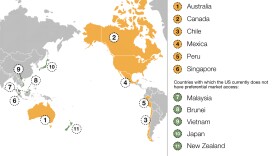By Joe Tarantino
http://stream.publicbroadcasting.net/production/mp3/wkms/local-wkms-898085.mp3
Paducah, KY – It's been 60 years since the Atomic Energy Commission announced Paducah would become the site of the Nation's second uranium enrichment plant. Today, in the first of this week's five part series, Paducah Remediation Services Communication Manager Joe Tarantino addresses the history of the Gaseous Diffusion Plant and outlines of the Department of Energy's involvement in the clean-up process.
In December 1950, the Atomic Energy Commission announced that Paducah would become the site of the nation's second uranium enrichment plant. Construction of the Paducah Gaseous Diffusion Plant began in 1951 and in October 1952 production of enriched uranium for use in the nation's nuclear weapons program began.
In the 1960s the plant mission changed from national defense to commercial use as it began providing uranium for use in commercial nuclear power plants and today is the nation's only facility where uranium is enriched for use in nuclear reactors. In 1993, Congress created the United States Enrichment Corporation to operate the nation's uranium enrichment facilities, ending more than four decades of operation by the U.S. Department of Energy and its predecessor agencies. USEC - now a private corporation - leases the operating facilities from DOE, which still owns the land and the buildings.
Construction and operation of the plant created an economic boom in western Kentucky and southern Illinois during the early 1950's. In addition to many workers needed to build the huge enrichment plant, ground also was broken for two new power plants to supply the needs of the PGDP. Those power plants continue to operate in West Paducah and Joppa, Illinois, as does a plant in Metropolis, Illinois, that supplies the PGDP with the uranium feed to the enrichment process.
In just one year during those early days, Paducah's economy doubled and its school enrollment soared 50 percent. In the five-plus decades since, the plant has provided well over five billion dollars in local economic impact and has created thousands of highly skilled jobs for local workers.
During those same early years of operation, standard operating practices resulted in the generation of hazardous substances, some being released into the environment.
Today, environmental cleanup is the Department of Energy's primary mission at the Paducah Gaseous Diffusion Plant site.
DOE's maintains a site office at the Paducah Gaseous Diffusion Plant site that oversees execution of day to day operations. The Paducah office is under the direction of the Portsmouth-Paducah Project Office, located in Lexington, Kentucky. The Lexington office is part of DOE's Environmental Management Program, which is responsible for cleanup work at facilities that once were part of the nation's nuclear weapons complex.
To perform its work at the Paducah Site, DOE oversees the work of experienced contractors that employ more than 700 people. A remediation contractor is responsible for the designing and implementing safe and effective cleanup projects. An infrastructure contractor provides security, maintains about 25 miles of roads, and more than 700 acres of land used to support plant operations. In addition, construction has been finished, of a facility that will convert nearly 40,000 cylinders of depleted uranium hexafluoride into a more stable form.
With an annual budget exceeding $100 million dollars, the DOE's environmental cleanup focus continues be a major economic factor in the region.
In future commentaries, we will talk about DOE's past, current, and future environmental work, the federal laws that control environmental cleanup, and the role of Kentucky, the U.S. Environmental Protection Agency, and the public in DOE's environmental restoration project.
Joe Tarantino is the Communication Manager for Paducah Remediation Services.





